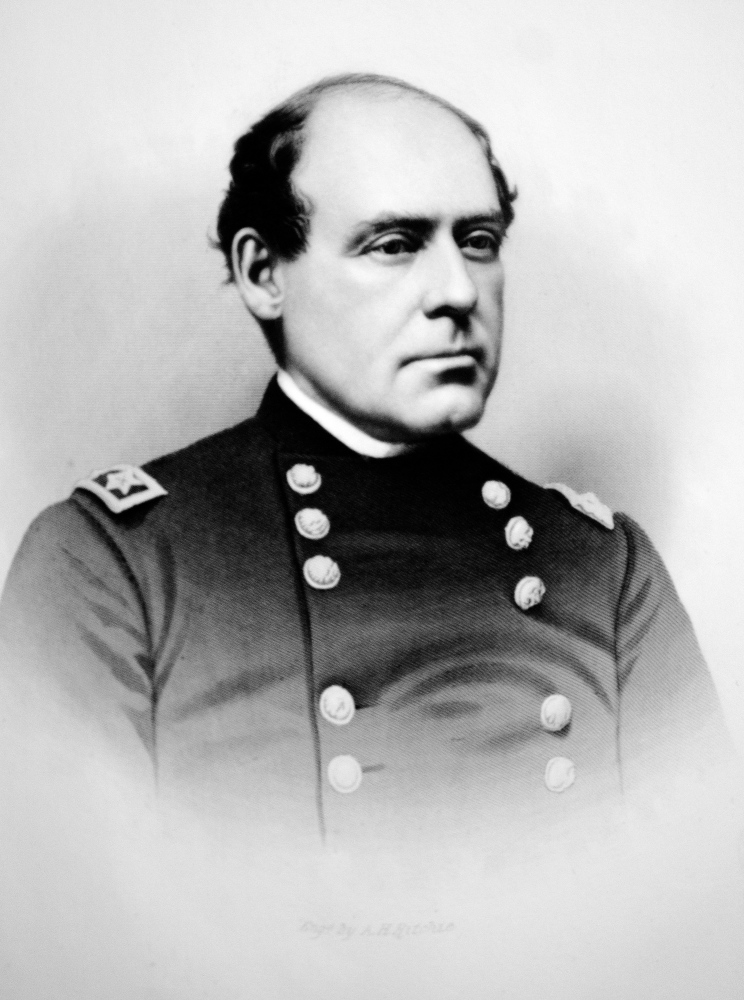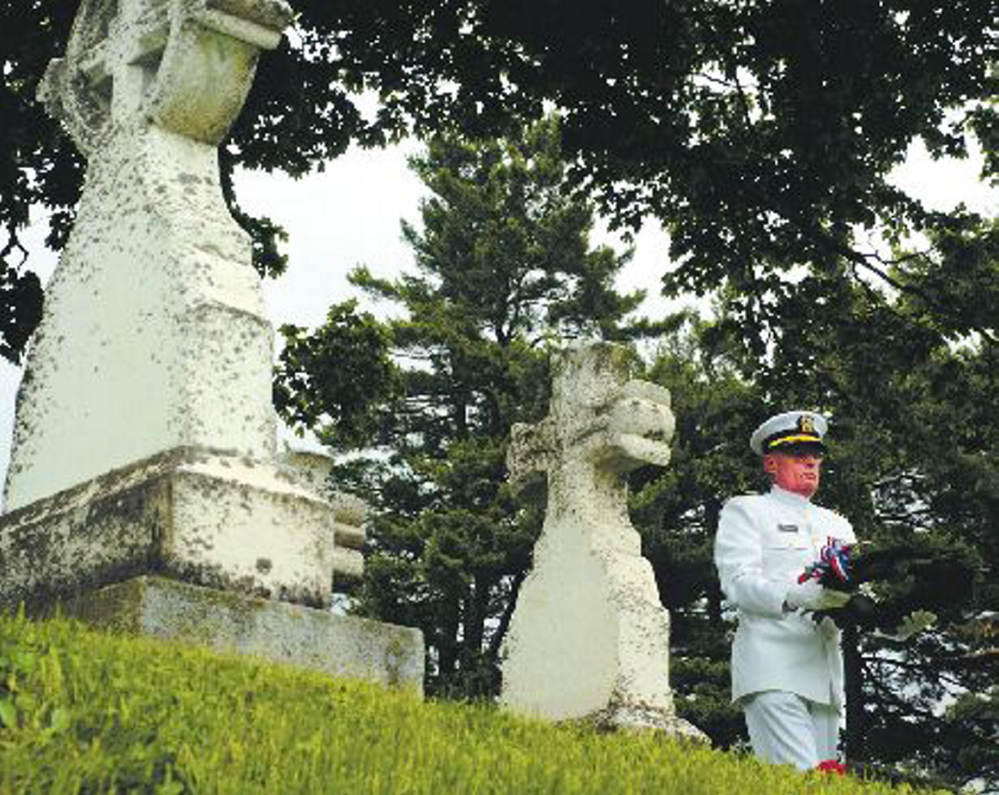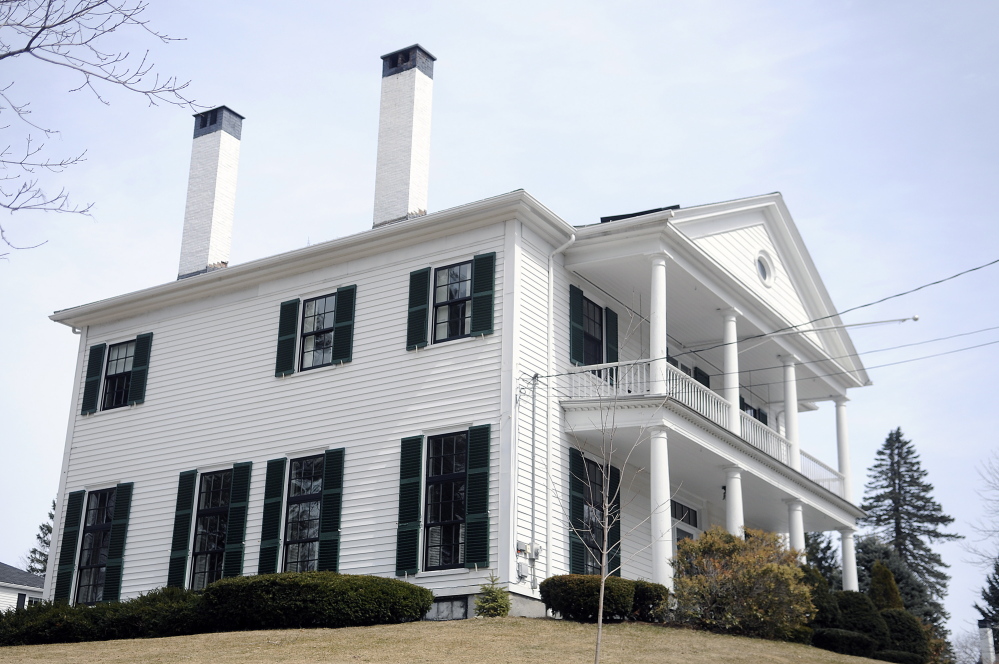AUGUSTA — Augusta native Maj. Gen. Seth Williams, riding alone and bearing a white flag as he forded the Appomattox River in Virginia to meet with the enemy, delivered the message from Union Gen. Ulysses S. Grant to Confederate Gen. Robert E. Lee that led to the end of the Civil War.
Wednesday, 150 years after that event, Augustans with a connection to Williams remembered his contribution to Civil War history.
Williams, inspector general of the Army of the Potomac, was entrusted by Grant, commander of the Union Army, to deliver his letter calling on Lee to surrender to avoid further bloodshed in what Grant said would be “the hopelessness of further resistance.”
Lee, while denying the Confederacy was in a position of hopelessness, said he shared Grant’s desire to “avoid useless effusions of blood and, therefore, before considering your proposition ask the terms you will offer on condition of its surrender.”
Thursday is the anniversary of the April 9, 1865, surrender when Lee, commander of the Army of Northern Virginia, offered his sword to Grant at the McLean House near Appomattox Courthouse. The war ended later that year.
Williams was present at the surrender and, according to Robert Fuller of Winthrop, a distant relative of Williams, was the only Union officer with whom Lee stopped to talk with directly.
Williams, a decorated veteran of the Mexican War, had served under Lee when both were at West Point.
“Grant must have thought Williams was a very fine officer to choose him to carry out this mission,” Fuller said. He noted Williams’ ties to Lee were also likely a factor in his being selected to deliver what was perhaps the most important communication of the Civil War.
Williams died at 43, of brain inflammation, at his sister’s home in Boston. Rather than be buried in Arlington National Cemetery or at West Point, his body was taken by train home to Augusta where he is buried in Forest Grove Cemetery on Winthrop Street.
While Williams didn’t marry or have children, at least two local residents are related to Williams — Fuller and Dan Stevens of Augusta.
Williams’ childhood home, built by his father, probate judge Daniel Williams, in 1820, is on Myrtle Street and is occupied by former Maine Chief Justice Daniel Wathen and his wife, Judy.
Williams’ stepmother was Stevens’ great, great-aunt.
Williams is not as well known as many other Civil War generals. Stevens said that could be, in part, because the family wasn’t one to seek publicity and also because he died young while others, including Maine’s better known Joshua Chamberlain, who attained the rank of brigadier general and also served four one-year terms as governor, lived much longer.
“He was quite a guy, and the family was very active in the community,” Stevens said of Williams.
Fort Williams, which once guarded the entrance to Portland and is now a Cape Elizabeth park, was named for Williams.
Fuller said he’s never been to the park, but plans to go soon. He said if there isn’t a plaque or any other recognition of Williams at the park, he plans to work to see that one is added.
‘KNOW YOUR PAST’
Wathen said he’s read about Seth Williams and has a portrait of his father hanging in the home. Wathen said he had admired the Federal style house and bought it from Stan Hussey in 1975. His is just the third family to own it.
An ell was removed in the 1930s. It’s a short distance away and is occupied by Wathen’s son.
“With the exception of the removal of the ell, the house is pretty much unchanged since it was built. It has been preserved,” said Wathen. “The house was really well built, solid as a rock. I take pride in the fact the house, inside, looks like it did when it was built.”
Volunteers, including Fuller, worked to secure a new stone for Williams’ gravesite because the older one, which remains alongside the new one, was worn and faded.
In 2007, the new grave marker was dedicated with Fuller, a retired Navy captain, participating in the proceedings, as did Civil War re-enactors with the 3rd Maine Infantry in period uniforms.
Those re-enactors included Mark Rohman, of Augusta, who is still a re-enactor but no longer with the 3rd Maine. He said he felt then, and now, it is important such historic figures are remembered.
“I think it is important to know your past, especially in your own town,” Rohman said. “And remember what (historical figures) stood for or accomplished. Hopefully someone will do the same for us one day.”
POST-WAR
Fuller, in an article he wrote for “The Journal of the Descendants of Mexican War Veterans,” said Williams was the son of his great-grandfather’s father-in-law. Fuller said at one point he had the epaulettes that were part of Williams’ general uniform, which he said were donated to a Civil War organization.
Fuller said Williams, after the Mexican War in the 1840s, “brought home, as a kind of trophy, a beautifully carved battle ax — possibly of Aztec origin — which was known in my family as ‘Santa Ana’s Wooden leg.’ My grandfather presented it to the Peabody Museum at Harvard, where it may still be seen.”
James W. North’s “History of Augusta” says Williams, then a lieutenant, visited Augusta following that war and at a party at the arsenal was presented a sword inscribed “Lieut. Seth Williams, USA. From his fellow townsmen: A tribute of respect and esteem to the Soldier and the Man.”
Fuller said he doesn’t know what happened to that sword.
Fuller noted Williams’ role in the Civil War was not as a leader of troops, but rather being responsible for much of the behind the scenes work of making sure troops were well-equipped and supplied, a demanding job which Fuller said likely contributed to his early death.
Fuller said that job included the unenviable task of dispensing limited resources to officers in the field.
In “The Illustrated History of Kennebec County,” published in 1892, Williams’ difficult job and his kind nature were described: “Though unflinching in the discharge of his official duties — however disagreeable they might prove to others — in his private character, when the cares of the camp were laid aside, General Williams was one of the most lovable of men.
“He possessed a rare charm of manner, a delicate and discriminating tact, and a never failing courtesy that drew all hearts to him, and made him as beloved as he was respected and admired.”
Keith Edwards — 621-5647
kedwards@centralmaine.com
Twitter: @kedwardskj
Copy the Story LinkSend questions/comments to the editors.








Success. Please wait for the page to reload. If the page does not reload within 5 seconds, please refresh the page.
Enter your email and password to access comments.
Hi, to comment on stories you must . This profile is in addition to your subscription and website login.
Already have a commenting profile? .
Invalid username/password.
Please check your email to confirm and complete your registration.
Only subscribers are eligible to post comments. Please subscribe or login first for digital access. Here’s why.
Use the form below to reset your password. When you've submitted your account email, we will send an email with a reset code.